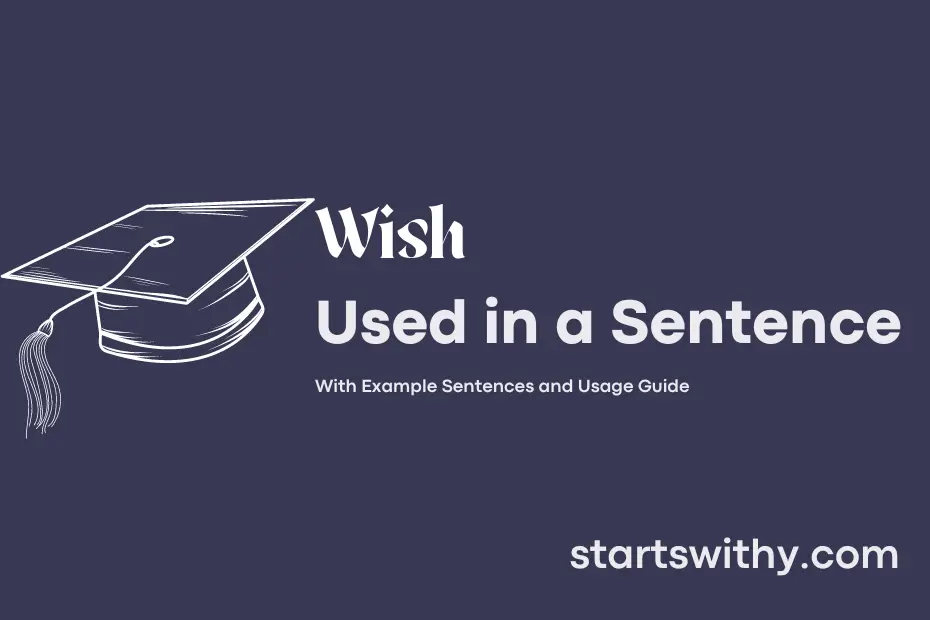Have you ever wished for something so strongly that you could almost feel it coming true? Wishing is the act of desiring or longing for something to happen, often accompanied by hope or belief in its possibility.
In language, a wish is typically expressed through verbs like “wish,” “desire,” or “hope,” and often involves imagining a hypothetical situation or outcome. Wishes can pertain to the past, present, or future, and are commonly used in various forms of communication to express aspirations, dreams, or regrets.
7 Examples Of Wish Used In a Sentence For Kids
- I wish for a big playground to play in.
- I wish for colorful crayons to draw with.
- I wish for a yummy chocolate cake for my birthday.
- I wish for a new toy car to play with.
- I wish for a butterfly to land on my hand.
- I wish for a rainbow to appear after the rain.
- I wish for a star to make a wish upon.
14 Sentences with Wish Examples
- I wish I could study abroad for a semester.
- I wish I had more time to work on my assignments.
- I wish I could join more clubs and societies on campus.
- I wish I could afford to attend that upcoming music festival.
- I wish I could improve my grades in this semester.
- I wish I could find a part-time job that aligns with my career goals.
- I wish I could have more opportunities for networking with industry professionals.
- I wish I could travel more during my college breaks.
- I wish I could have more options for healthy food on campus.
- I wish I could have a more comfortable place to study.
- I wish I could meet more people from different cultural backgrounds.
- I wish I could get more recognition for my academic achievements.
- I wish I could find a mentor to guide me in my career path.
- I wish I could have more support for my mental health and well-being.
How To Use Wish in Sentences?
Wish is a versatile verb that can express desires, hopes, or intentions in a sentence. To use Wish effectively, first identify what you want to convey — either a present desire, a past regret, or a future hope. Next, follow these guidelines for incorporating Wish into your sentences:
-
Present desires: When expressing a current wish, use Wish followed by “I” or “we” and the verb in the past tense. For example, “I wish I were taller” or “We wish it would stop raining.”
-
Past regrets: To convey regret about a past situation, use Wish followed by “I” or “we” and the past perfect verb form. For instance, “I wish I had studied more for the exam” or “We wish we had listened to your advice.”
-
Future hopes: When expressing a desire for something in the future, use Wish followed by “I” or “we” and the verb in the would/could/should + base form. For example, “I wish I could go on vacation next month” or “We wish it would be sunny for the picnic.”
By following these simple guidelines, you can effectively use Wish to communicate your desires, regrets, or hopes in a clear and concise manner in your sentences.
Conclusion
In conclusion, “sentences with wish” illustrate desires or hopes for something different or better. These sentences express yearning for a different outcome or express a longing for a change. Whether it’s wishing for luck, wishing for better health, or wishing for a brighter future, these sentences convey a sense of aspiration and positivity. From simple wishes for a good day to more complex wishes for life-changing events, these sentences demonstrate the power of hope and optimism in language.
By using sentences with wish, individuals can communicate their dreams and aspirations effectively. Whether spoken or written, these sentences carry a sense of hope and possibility, inspiring both the speaker and the listener. They serve as reminders of the potential for change and improvement, encouraging positivity and a forward-looking mindset in communication.



